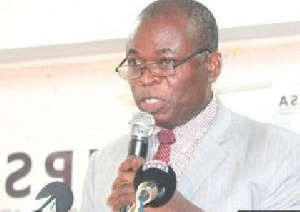By: Kwame Okoampa-Ahoofe, Jr., Ph.D.
He does not have much credibility when it comes to procurement policy, but the Deputy Minority Leader is spot on when he argues against the cabinet appointments diarrhea that seems to have struck the Presidency like an epidemic (See “Akufo-Addo Might Need Ministers for Whatsapp, Facebook – James Avedzi” Citifmonline.com / Ghanaweb.com 3/19/17). He does not have much credibility because in the wake of the sole-sourcing scandals uncovered vis-à-vis the thoroughgoing corrupt procurement practices of the Mahama-led government of the National Democratic Congress (NDC), in particular the vice-president’s $ 14 million mansion boondoggle, Mr. Avedzi was widely reported by the media to have said that competitive bidding, which is widely acknowledged the world over as the most reliable process for ensuring cost-management and budgetary efficiency or savings, would be a bad policy should it be implemented by the key operatives of the Akufo-Addo Administration.
The foregoing suggestion, you guessed it, came from Vice-President Mahamudu Bawumia, the distinguished first-rate and world-class economist whom the key machine operatives of the main opposition National Democratic Congress most love to hate. That the corrupt political culture of sole-sourcing, with its inbuilt policy of bribery, has been the bane of the dire economic straits of our national treasury, does not seem to bother Mr. Avedzi the least bit, perhaps for two strategic, or rather tactical, reasons. One of the reasons may clearly be the need for the Deputy Minority Leader to ensure that the Akufo-Addo government ends up becoming the same abysmal failure as the Mahama government, thus ensuring that a badly beaten and crestfallen National Democratic Congress’ constabulary would have a fighting chance come Election 2020.
Unfortunately for rogue politicians like Mr. Avedzi, the market-economy-oriented key players of the New Patriotic Party (NPP) have the edge when it comes to effectively strategizing for the exponential growth of the country’s economy. We must also quickly point out the fact that both Presidents John Agyekum-Kufuor and Addo Dankwa Akufo-Addo have a studious and practical appreciation of the dynamics of the Ghanaian economy that could not be said of either Chairman Jerry John Rawlings or President Mahama. Which pretty much explains why between 2001 and 2009, the Kufuor-led government of the New Patriotic Party was able to quadruple the size of the Ghanaian economy.
I have deliberately omitted mention of President John Evans Atta-Mills, late, because whatever economic prosperity is associated with his tenure, from 2008 to 2012, was inescapably the carryover fruits of the labor of the key operatives of the Kufuor Administration, especially vis-à-vis the striking of oil offshore of Cape-Three-Points. The discombobulating rationale behind the decision by President Akufo-Addo to up the number of cabinet and deputy cabinet appointees notwithstanding, it is almost certain that come Election 2020, this government would have achieved enough of its benchmark targets to be retained at the flagstaff House.
The faux-socialist and corrupt practices of the leaders of the Rawlings-minted National Democratic Congress are well behind the times. Nevertheless, Mr. Avedzi has a point in pooh-poohing the stacking up of the ministerial portfolios with what clearly appears to be redundant labor, if also because virtually every one of these ministries is fully staffed by career civil servants whose only need is policy guidance from a representative or two from the central government, not three, four or five! Indeed, the President’s argument that 65-percent of his cabinet appointees are already substantive Members of Parliament, whose salaries may only need to be marginally topped up, does not cut ice, as Virginia Woolf, the great English essayist and thinker once put it. For as the tired maxim goes: “It is little drops of water that make up the mighty ocean.” Every pesewa saved better positions the government to be able to embark on more quality-of-life-improvement ventures. This is what the protection of the public purse ought to be about.
By: Kwame Okoampa-Ahoofe, Jr., Ph.D.
English Department, SUNY-Nassau
Garden City, New York
E-mail: okoampaahoofe@optimum.net
*Visit my blog at: kwameokoampaahoofe.wordpress.com Ghanaffairs

